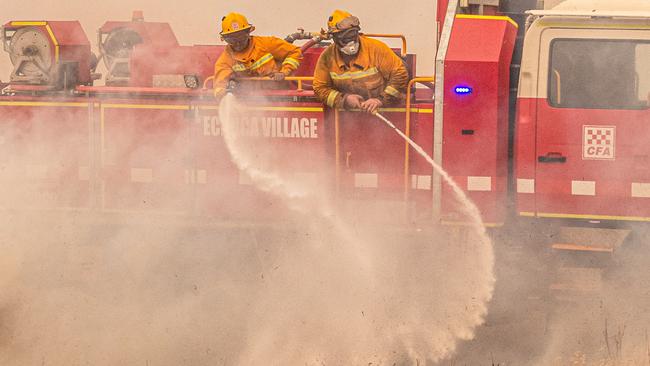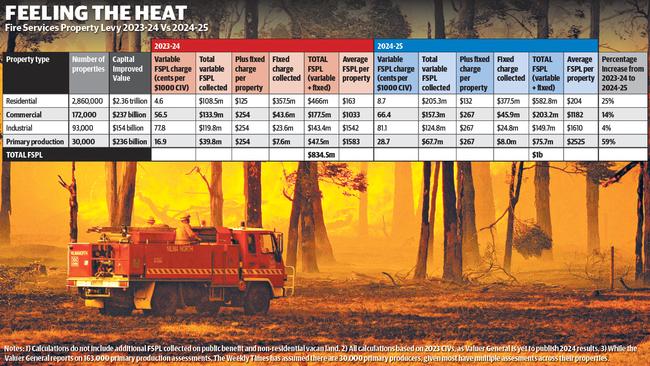Fired up: CFA’s farming volunteers pay price of union demands
Farmers are about to be hit with Fire Services Property Levy hikes of almost 60 per cent, to help cover union pay demands.

Victorian Farmers’ Fire Services Property Levy contributions will rise from $47.5 million this financial year to $75.7m in 2024-25 – a 59 per cent increase.
The Weekly Times analysis of the new levy and fixed charges to come into effect on July 1, shows the average farmer’s FSPL will rise from $1583 to $2524, with many paying far more.
But what angers farmers, most of whom are volunteer firefighters, is that much of the FSPL increase will go towards United Firefighters Union demands for higher pay, while the CFA struggles to replace ageing trucks and dilapidated stations.
Last year the UFU rejected an offer of a three per cent pay rise each year for the next four years, plus a $7359 sign on bonus, plus another $2021 annually for four years, which would add at least $58m to the FRV wages bill of $888m in 2024-25 alone.
Since then UFU branch secretary Peter Marshall has been demanding a $117.6m share of the $203.8m in efficiency savings generated from the July 1, 2020, merger of the MFB and 38 CFA stations to form FRV.
Mr Marshall has even demanded his UFU members get free public transport passes and FRV wholly fund their health insurance, plus hikes in their allowances, on top of an overtime that topped $104.5m in 2022-23.
Tempy farmer Leonard Vallance said the FSPL hike to fund UFU wages was a joke, especially when most farmers were CFA volunteers, who stopped work to jump onto fire trucks for free.
“Farmers are putting their own fires out, in their own time and often with their own equipment,” Mr Vallance said.
Gre Gre CFA volunteer brigade captain and farmer Peter Knights said “it’s insulting that they slap us with a big FSPL, while we’re running around in 35 to 40-year-old trucks”.
Mr Knights, who is also an accountant, said that while he and other farmers were being hit with hefty FSPL increases, the Allan Labor Government was giving solar and wind turbine operators a free ride.
Last year Treasurer Tim Pallas walked away from changes to the Valuation of Land Act that would have dramatically increased the renewable energy sector’s FSPL contributions.
The backdown followed lobbying by the Clean Energy Investment Group, which argued it would add $2m a year to the cost of projects such as the 1.3GW Golden Plains Wind Farm, equal to $10,000 a turbine.
But farmers and CFA volunteers say these same projects are adding to fire risk in their communities, as new powerlines are built to feed solar and wind power into Sydney, Adelaide and Melbourne.
“It’s adding insult to injury that they want to put all this infrastructure – transmission lines, wind towers and solar – in our backyards – that increase the fire risk, while we pay more in FSPL and provide free labour (as CFA volunteers),” Mr Knights said.
The Weekly Times analysis of the new FSPL variable and fixed charges shows that while farmers will pay 59 per cent more in 2024-25, people living in towns and cities will pay an extra 25 per cent, businesses an additional 14 per cent, while major industrial users pay just four per cent more.
When asked how Allan Labor Government could justify imposing such a hefty FSPL increase on farmers, Treasurer Tim Pallas’ office said “this is a modest increase broadly in line with inflation.
“All levy proceeds go to supporting the State’s fire services, including vital life-saving equipment, firefighters, staff and volunteers, training, infrastructure and community education.”
Yet the government’s own budget forecasts its FSPL revenue will rise from $847m this financial year to $1.033 billion in 2024-25 – an average 23 per cent increase across all property classes.
Department of Treasury and Finance bureaucrats said the FSPL on the median, not average, primary production property, worth $1.16m, had only risen from $450 to $600.
But most Victorian farmers dismissed the $1.16m figure as a joke, given most viable commercial farms are worth far more.
Orbost dairy and beef producer Chris Nixon said farmers had long argued the FSPL should be based on the value of “burnable assets”, meaning a property’s capital improved value minus its site value.
“Why are we paying the fire levy on land that doesn’t burn, the argument just doesn’t stack up,” Mr Nixon said, whose FSPL will rise from about $3400 this financial year to more than $5700 on July 1.
More Coverage





